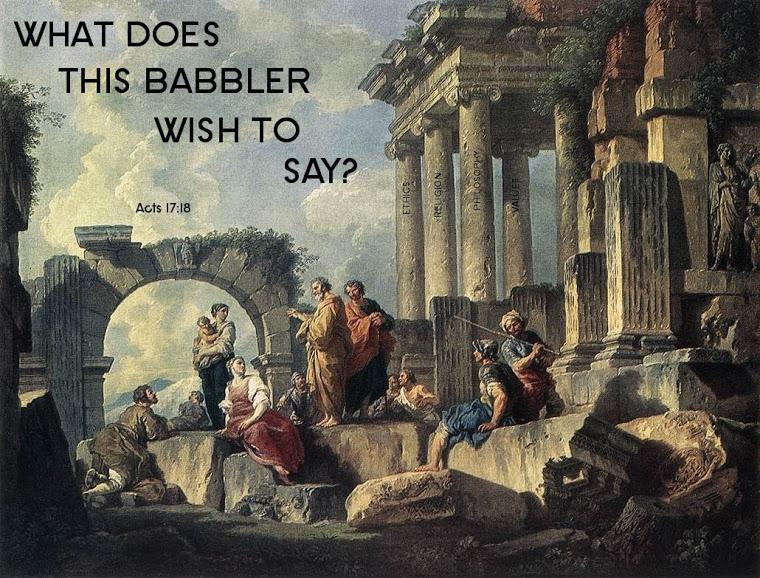
Apostle Paul at the Areopagus
There was a time in Israel when “the word of the LORD was precious in those days; there was no open vision.”
That certainly does not describe most parts of Nigeria today. Not with the number of churches on every street of many towns and villages. Not with the number of sponsored religious programmes on Radio and Television. Not with the countless book titles being spawned daily by various preachers and publishing houses. Even in regions with apparently “closed doors”, there are countless opportunities for “word-invasion” with internet and cable TV.
If anything today, it appears that over-supply has led to loss of value. It turns out that the ‘abundance’ of the word of God – written, spoken, broadcast, e-mailed, face-booked, sms-ed or tweeted has led to a familiarity with negative implications. The world seems to have heard it all. There truly is nothing new anymore under the sun. The Adamic nature of men has been so inoculated with sub-lethal doses of ineffectual word that it no longer responds to spiritual treatment. We have become a generation with jaded ears. Not even Christians are spared from this deadening surfeit of ineffectual proselytizing. We have today a generation of religious pilgrims who move from one camp to another and from one mountain to another ostensibly in search of yet more powerful words from even more powerful speakers. The Word does not seem to “cut” again.
Back in Athens.
And so it is this day, that preachers have the unenviable task of preaching to a word that no longer hears nor regards the word of God. It is like they said of Apostle Paul at Athens “What will this babbler say”! The average unbeliever knows the scriptures you are going to quote, and the ones you have quoted. He simply has chosen not to believe. As you open your mouth to speak, he is already switching off, asking himself “what does this babbler want to say” It could be a lot less polite or even violent. You could be asked to shut up. Or you could find out that your message is being received with a lot of chucking and shaking of head. The world has always turned its back on the Word, but we now live in a generation and culture that says, like Pharaoh: “Who is that God, that I should obey him” It is a generation that actively seeks to exalt itself above everything that is of God. It is no longer enough not to believe, it is now required that those who do believe should no longer do so openly so as not to offend those who do not believe!
The Preachers? Challenge

The preachers’ challenge today is not the putting together of appropriate words and scriptures for a beautiful sermon. Our jaded ears have heard them all. It is to challenge unbelief and indifference the same way the ancients did. It is to show the world that the God whose obituary they have been announcing is alive and active in our generation. Education and Bible College certificates alone will not do it. Let us look at three examples of men who challenged heathen cultures with great results. I believe our solution lies in following the pattern.
There was Moses, who was asked by a hardened Pharaoh: “Who is the LORD, that I should obey his voice to let Israel go?” There was Elijah before apostate Ahab. And there was Peter confronting a contrary religious establishment with the Gospel. In each of these cases, it took more than mere words. Moses gauged the situation rightly. “Behold,” he told God, “they will not believe me, nor hearken unto my voice: for they will say, The LORD hath not appeared unto thee.” God answered Moses : “And thou shalt take this rod in thine hand, wherewith thou shalt do signs. And it shall come to pass, if they will not believe thee, neither hearken to the voice of the first sign, that they will believe the voice of the latter sign.”
Elijah was no less equipped to arrest the attention of his generation. He prophesied at the time of Ahab, who had the unenviable description that he “did evil in the sight of the LORD above all that were before him”. He was not only evil; he caused Israel to be evil and apostate like him. When Elijah was going to confront him, it was with a sign from the Lord: “there shall not be dew nor rain these years, but according to my word”. When he re-appeared to Ahab three years later, it was to unleash other signs: He made fire to fall from heaven to consume his sacrifice, and caused the rain to fall, after three years of drought.
When God Shows Up
When God followed Moses to Egypt with signs, Pharaoh had to re-appraise his opinion about God and the need to obey his voice. When Elijah showed up with God before Ahab, it was no longer difficult for backslidden Israel to confess: “The Lord, he is God”. Indeed, “Say unto God, How terrible art thou in thy works! through the greatness of thy power shall thine enemies submit themselves unto thee.” (Psa 66:3). We must learn the secret of the Ancients, if we must get this generation to listen again.
For the Apostles, facing the Sanhedrin, the Sadducees, or the Roman Empire, was no less a daunting challenge.Peter and John had no new scriptures to quote to the Sanhedrin. However, with the arrival of Pentecost, God announced himself once again with signs and wonders ? the cloven tongues of fire, and the supernatural tongues of the disciples. Peter was then able to boldly quote the same old scriptures with new fire. The effect was electric: a people that remained largely impervious to Jesus’ message for three years were suddenly pricked in their hearts and began to ask: “Men and brethren, what shall we do?” There were three thousand conversions from that single sermon!
And So What Shall We Do Now Too?
We need to see a common pattern in the lives of the men we just mentioned. Moses moved after his encounter with God at the burning bush. Elijah said “As the LORD God of Israel liveth, before whom I stand” The Disciples were in fervent prayers before Pentecost came. These men had a deep relationship with the Lord. You may have speech difficulties like Moses, or be “unlearned and ignorant” like Peter, or have a “weak bodily presence and contemptible speech” like Paul, nevertheless, when your message is impregnated by the Holy Spirit, you will get the attention of the jaded ears of this generation. When you spend time with Jesus and bring a message from him, backed by the Holy Spirit, the world must listen.
Like the early Apostles, there is need for people who will share the message to spend much time in prayer and communion with the Lord. And what was their prayer?
“they lifted up their voice to God with one accord, and said, Lord, thou art God, which hast made heaven, and earth, and the sea, and all that in them is: ? grant unto thy servants, that with all boldness they may speak thy word, By stretching forth thine hand to heal; and that signs and wonders may be done by the name of thy holy child Jesus. And when they had prayed, the place was shaken where they were assembled together; and they were all filled with the Holy Ghost, and they spake the word of God with boldness.” (Act 4:23-31)
Go ye and do likewise!





